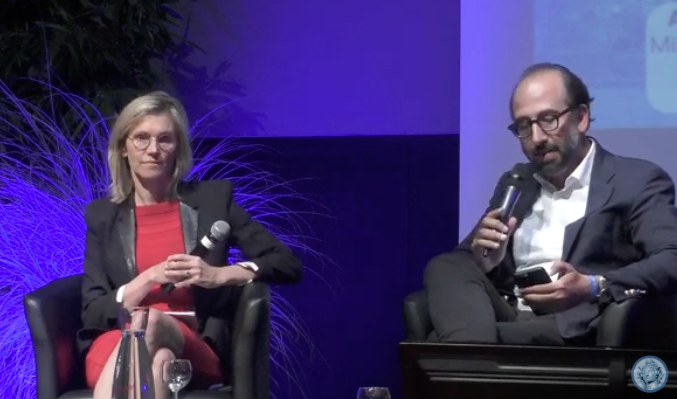In a compelling dialogue at Autun in 2025, Eric Hazan and French Minister of Ecological Transition Agnès Pannier-Runacher explored the foundations of "popular ecology"—an approach that makes environmental action accessible, just, and rooted in territorial realities.
Ecology as a Human Imperative
Minister Pannier-Runacher emphasized a fundamental principle: "I don't work for the planet. The planet will take care of itself—it has already survived five extinctions. I work for humans." This human-centered approach to ecology focuses on concrete daily concerns: what we eat, what we breathe, what we drink.
"Popular ecology means that ecology should not be a luxury reserved for big cities, but a viable response to three crises: climate crisis, biodiversity collapse, and various forms of pollution."
The dialogue highlighted a striking statistic: 72% of jobs in European companies critically depend on healthy natural ecosystems—yet these "free" resources are often invisible in economic calculations.
The minister shared a revealing experience from her legislative campaign, where voters initially rejected discussions about ecology but then passionately described their concerns about food quality in school canteers, illegal dumping in local forests, and pollution concerns—all ecological issues at their core.
Ecology as National Sovereignty
Beyond environmental concerns, the dialogue positioned ecology as a sovereignty issue. As competition intensifies for scarce natural resources—energy, water, land, raw materials—ecological strategy becomes essential for national security and economic independence.
Hazan contextualized this within global value chain transformations, noting how Europe's historical integration into international supply chains, while economically beneficial, has created vulnerabilities exposed by geopolitical and climate shocks.
From Abundance Economy to Ecological War
Drawing on Pierre Charbonnier's analysis, the speakers described how the post-WWII peace was built on an "abundance economy" fueled by natural resource consumption. This model enabled social progress and middle-class emergence but is now reaching its limits.
We are transitioning from this abundance economy to what Charbonnier calls "ecological war"—where resource sharing, sobriety, and sustainable models become security conditions for populations. Climate adaptation and emission reduction are no longer environmental nice-to-haves but existential necessities.
Middle Class Challenges and Democratic Ecology
The dialogue addressed a critical challenge: middle-class skepticism toward ecological transformation. As middle classes face economic decline across developed countries, ecological policies can appear as "renounced freedoms."
The solution proposed involves creating more just, concrete, and democratic ecology:
- Territorial ecology—debated and implemented locally with citizen participation
- Just ecology—incorporating social progressivity in environmental responses
- Democratic ecology—ensuring broad participation in environmental decision-making
- Progressive ecology—viewing environmental action as innovation and advancement
From National Planning to Local Implementation
Minister Pannier-Runacher outlined a two-level approach: national planning that ensures coherent scenarios (as successfully demonstrated in energy policy) followed by territorial implementation through "territorial COPs" that provide local actors with appropriate tools, expertise, and funding.
This approach recognizes that ecological solutions vary by territory—coastal areas need different adaptation strategies than mountainous regions or flood-prone areas.
Agriculture: First Victims, First Ecologists
A significant portion of the discussion addressed agriculture's role in ecological transition. Both speakers emphasized that farmers are the first victims of climate change, with emergency support for climate disasters rising from tens of millions to billions of euros in just a decade.
They called for ending caricatures and recognizing farmers as "first ecologists" whose work depends on environmental health, while acknowledging the need for better policy frameworks that work with natural rhythms rather than imposing rigid bureaucratic rules.
The Path Forward: Resilience and Innovation
The dialogue concluded with emphasis on resilience as both necessity and opportunity. Companies and territories that anticipate ecological transformation will face future climate shocks at lower cost, creating competitive advantages.
This isn't about returning to an idealized past but building a more desirable future through cooperative action. The alternative—climate inaction—leads to a far less desirable outcome.
"Immobility is deadly for our economy and our social pact, beyond its ecological impact."
Global Context: Learning from China
The discussion acknowledged China's ecological leadership, noting that China appears to have reached peak greenhouse gas emissions and deploys half the world's renewable energy. China views ecological transition as economic opportunity, controlling 40-80% of market share in most ecological transition sectors.
This positions Europe's choice clearly: build defensive barriers around historical activities or embrace transformation and claim a stake in the new market redistribution.
Reconnecting with Nature
The dialogue concluded with a crucial point often overlooked in policy discussions: 60% of French people have lost their connection to nature. As the first species to extract itself from nature while remaining biologically dependent on it, this disconnection creates suffering.
Restoring this connection—through culture, art, and direct experience—offers both health benefits and stronger foundations for environmental policy. Studies show that patients with serious pathologies benefit significantly from forest immersion or ocean exposure, providing tangible benefits without expensive interventions.
This article summarizes a rich dialogue between Eric Hazan and Minister Agnès Pannier-Runacher. Watch the complete discussion:
🎥 Pour une écologie populaire au service de la revitalisation des territoires (French, YouTube)
